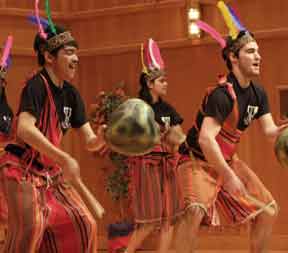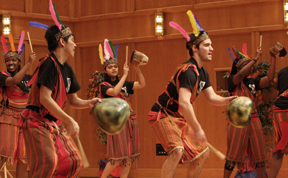Wamidan — the College’s world music and dance ensemble — will travel to the Northern Kentucky University World Culture Festival this weekend. The group, under the direction of Professor James Makubuya, will perform six African music and dance numbers on Saturday afternoon.

The World Culture Festival is a daylong celebration of people and culture, and includes performers representing Salsa, Panamanian dance, Native American music, Indian and Middle Eastern music, steel drums, Fusion music, and a concert by Northern Kentucky University’s Gospel Choir.
The event will be held on the Plaza Level of the Northern Kentucky University beginning at 11:00 a.m. and continuing throughout the day. Wamidan will perform at 1:00 p.m. on the Oakley and Eva G. Farris Amphitheatre Stage just north of the University Center building. There will be two alternating stages of world music performers.
“We are very excited about performing in the inaugural NKU World Culture Festival,” said Makubuya, who founded Wamidan at Wabash in 2000. “Since the fall semester started, we have been very active in practicing new dances and new instrumental pieces.
“So on Saturday, Wamidan will explode on stage with six very good numbers, including two large dances, one dance trio, two large instrumental ensemble pieces, and one chamber piece of three adungu players.”
The World Culture Festival also includes arts and crafts vendors, a World Food Court developed by local ethnic restaurants, children’s activities, an international fashion show, and shows at the Haile Digital Planetarium and Anthropology Museum.

“Being the first year for what is hoped to be an annual festival, I am very hopeful that this festival, the first of its kind in the greater NKU/Cincinnati area, will create a buzz of excitement in our community and gain strength and size in following years,” said event organizer Scott Lang, who directs percussion studies at NKU.
Once again this year, Wamidan includes dancers from nearby DePauw University. Although it was originally founded “for those interested in exploring the artistic and scientific myths and mysteries of Sub-Saharan African music,” Wamidan has expanded to offer a forum for members to extend their talents to music and dances of cultures from different parts of the globe.
The unique musical instruments used by Wamidan performers include East African bowl lyres, bow harps, thumb pianos, tube fiddles, log xylophones, panpipes, conical and cylindrical drums, West African goblet drums – and most recently Australian Aboriginal didgeridoos and Nigerian slit-drums.
“Following [Wamidan’s] two performances at the Africa Network conferences, the executive committee strongly recommended that Wamidan would provide an excellent display of African music performance and dance at the festival,” Lang added.
The Wamidan concert program will include the African folk dances Olukhun, Baakisimba, and Mwana Wa Mbere. The group will also perform Mia Wea (using adungu bow harps), Muli Mutya? (using lyres, fiddles, and xylophones), and Siduleka (featuring a bow harp trio).
 The World Culture Festival is a daylong celebration of people and culture, and includes performers representing Salsa, Panamanian dance, Native American music, Indian and Middle Eastern music, steel drums, Fusion music, and a concert by Northern Kentucky University’s Gospel Choir.
The World Culture Festival is a daylong celebration of people and culture, and includes performers representing Salsa, Panamanian dance, Native American music, Indian and Middle Eastern music, steel drums, Fusion music, and a concert by Northern Kentucky University’s Gospel Choir. “Being the first year for what is hoped to be an annual festival, I am very hopeful that this festival, the first of its kind in the greater NKU/Cincinnati area, will create a buzz of excitement in our community and gain strength and size in following years,” said event organizer Scott Lang, who directs percussion studies at NKU.
“Being the first year for what is hoped to be an annual festival, I am very hopeful that this festival, the first of its kind in the greater NKU/Cincinnati area, will create a buzz of excitement in our community and gain strength and size in following years,” said event organizer Scott Lang, who directs percussion studies at NKU.